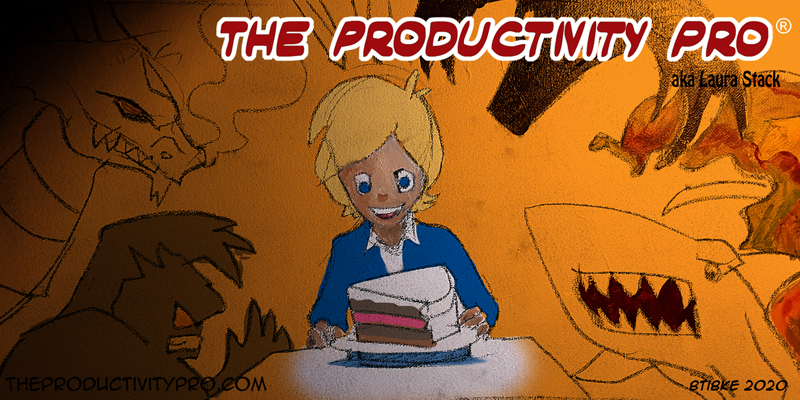
“Complaining can be an easy way to bond with people. Feeling like things are less than perfect can be an automatic place for your mind to rest.”—Marie Forleo, American media pundit
During these trying COVID-19 times, when everyone is stuck at home, it can be difficult to be grateful. Oh, sure, you thought you’d love to be able to work from home full-time, but when it happened, many people changed their minds and got down in the dumps. It’s hard not to be able to go anywhere and visit your favorite restaurants. So how can we be grateful in times like this?
When I began researching the concept of gratitude as a productivity enhancer, I wanted to take a holistic view and discuss both the positives and negatives. Admittedly, the term “gratitude” indicates a lack of negative associations; there’s a reason the Roman orator and philosopher Cicero called it “not only the greatest of the virtues, but the parent of all others.” As for modern pundits, no one really talks about the downside of gratitude. Oh, sometimes they say they will; but even then, the message almost always remains relentlessly positive. Hence the quote above; though Ms. Forleo goes on to call gratitude a killer, she brands it a killer of self-pity, jealousy, bitterness, and regret.
She’s not wrong. Gratitude isn’t just some New Age concept that’s recently invaded the workplace. There are solid, practical reasons to take the concept seriously. Still, I’ve unearthed a few negatives about this gratitude business:
- Initially, it sounds silly. First off, we’re told to express an “attitude of gratitude,” making it sound like one of those business clichés we’re all so sick of. Maybe the phrase is a little cutesy, but the intent is to make the idea memorable via rhyme, and it definitely does—so maybe we shouldn’t be so hard on it. One second glance, it’s not as Zen or inane as it sounds. The point is not to ignore all the negative things in your life, but to focus on the positive as you fix those things.
- Be specific in your gratitude. Trying to be generally grateful is, well, trying. Those who go the “happy happy, joy joy” route without knowing exactly what they’re grateful for wear out quickly. It’s a lot easier to express gratitude for specific people or things and let them buoy your mood, whether it’s your pets, family, friends, or that Mustang you’re rebuilding in your spare time. Then you can better appreciate why it’s so important to stay productive at work.
- Stop with the seasonality. Perhaps the worst thing about gratitude is that most people only pull it out at the holidays, rather than making it an everyday habit. That’s all well and good, but it hardly translates into a permanent habit of productivity.
A positive attitude may not be everything—you can be a sourpuss and still produce like mad—but here’s why being grateful for your work is important:
- It makes it easier to become and stay engaged. It’s hard to feel constantly negative and still own your job. About seven in ten American workers are disengaged from their work; they do it mostly for the paycheck. If you allow gratitude to encourage a positive approach to your work, you’re likely to become and remain more productive.
- You’ll innovate more. Grateful, engaged employees inject energy and emotional connection into the workplace, and ultimately achieve most of the innovation.
- You’re easier to work with. Though relentless positive people may irritate those who aren’t, gratitude typically makes it a lot easier for your coworkers and you to interact. The smoother the interaction, the easier you get your work done, and the more productive you (and probably your coworkers) become. Your attitude of gratitude creates a more motivational environment, too.
- It’s easier to divert negative emotions. We all feel negative emotions, from pain, fear, blame, anxiety, uncertainty, and more. And do let yourself feel them, because to try otherwise would be unhealthy. But gratitude for what’s going right can help you control what’s wrong, so it doesn’t fester and poison your work, stunting or killing productivity.
I Wanna Thank You
The “pros” list above includes just a few of the positive aspects of maintaining an attitude of gratitude, however trite it sounds. Genuine, extended gratitude comes from a full acceptance of the concept, and from pinpointing what you’re grateful for in life. This isn’t a once-and-done exercise. Most experts suggest keeping a gratitude journal where you write down, at least weekly, a list of the specific things you’re happy for in an optimistic tone. You can also use a simple worksheet if you like, or just review what you’re thankful for every day. Take a cue from the old song and accentuate the positive. You may have a lot of negative things in your life, and you dare not ignore them— but your gratitude list isn’t the place for them.
© 2020 Laura Stack. Laura Stack, MBA, CSP, CPAE is an award-winning keynote speaker, bestselling author, and noted authority on employee and team productivity. She is the president of The Productivity Pro, Inc., a company dedicated to helping leaders increase workplace performance in high-stress environments. Stack has authored eight books, including FASTER TOGETHER: Accelerating Your Team’s Productivity (Berrett-Koehler 2018). She is a past president of the National Speakers Association, and a member of its exclusive Speaker Hall of Fame (with fewer than 175 members worldwide). Stack’s clients include Cisco Systems, Wal-Mart, and Bank of America, and she has been featured on the CBS Early Show and CNN, and in the New York Times. To have Laura Stack speak at an upcoming meeting or event, call 303-471-7401 or contact us online.


